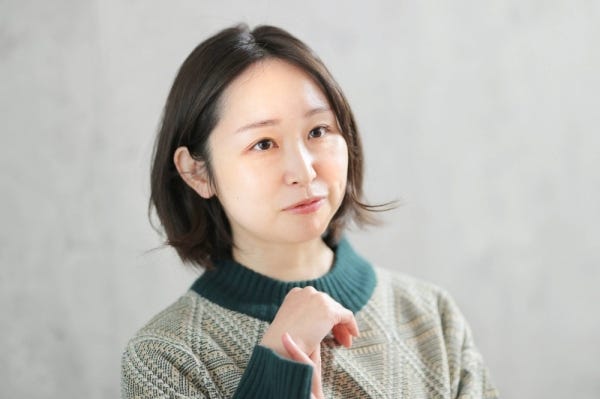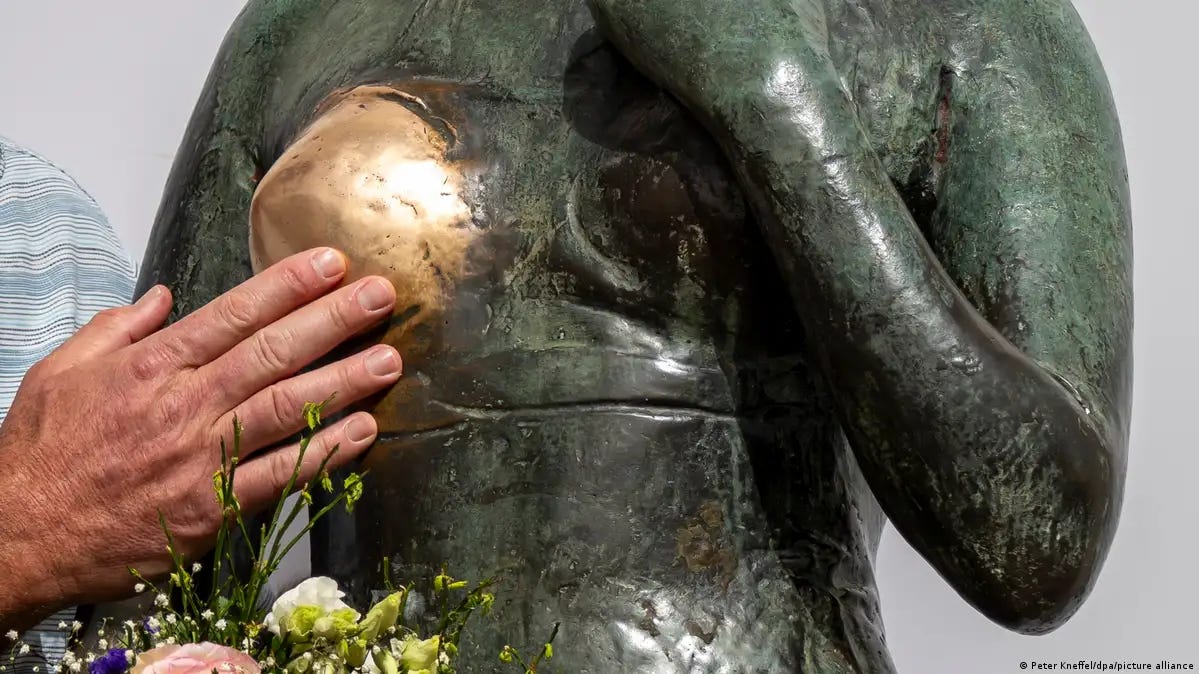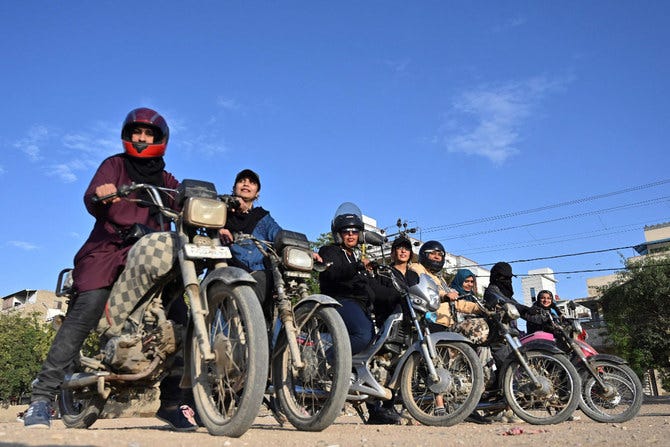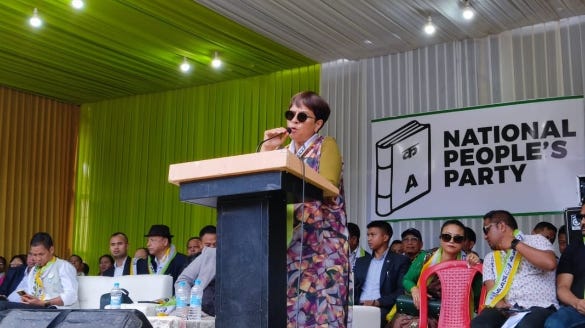Global Roundup: Japanese #KuToo Movement, Germany Female Statues, Switzerland Women’s Climate Case, Pakistani Women “Rowdy Riders”, Protection of Matrilineal Society in India
Curated by FG Contributor Inaara Merani
Actress Yumi Ishikawa speaks during an interview on Monday in Tokyo. JIJI. (Japan Times)
Yumi Ishikawa started the #KuToo campaign in 2019 to speak out against companies that forced women to wear high heels to work. She now wants to draw more attention to the issue of sexual abuse in Japan. The movement is a play on two Japanese words: “kutsu”, meaning shoes, and “kutsuu”, meaning pain. The #KuToo movement was inspired by the #MeToo movement against sexual harassment and assault in the US.
After tweeting about how tired she was of wearing heels at work and receiving thousands of retweets and responses, she launched a petition to ban high-heel stipulations by employers in Japan which garnered more than 30,000 signatures. Ishikawa challenged both the traditional dress codes for women and the shaming culture that has prevented Japanese women from speaking out against social injustices.
Compared with sexual harassment and assault, foot pain is easier to speak up about. Even people usually indifferent to feminism or female discrimination reacted (to the movement) at that time. – Yumi Ishikawa
Ishikawa believes that positive changes in the social environment have created an opening for women to speak about sexual harassment and assault, however, she says that no change or justice is achieved until someone speaks out. Although the #KuToo movement has highlighted the inequalities women face in the workplace in Japan, especially sexual discrimination, Ishikawa hopes to draw more attention to the sexual harassment and assault against women in the workplace and beyond.
The breasts of the statues have a much brighter glow than the rest of the statue, a clear result of "where they are most often touched," according to Terre des Femme Image: Peter Kneffel/dpa/picture alliance. (DW)
German women’s rights organization Terre des Femmes launched a powerful campaign, “unsilence the violence”, in three German cities to showcase how sexual harassment can have lasting impacts on survivors. On large, white placards read the campaign’s slogan “Sexual harassment leaves a mark” – these signs were installed behind three bronze statues of nude women with breasts which have become visibly lighter from frequent touching.
Sexual harassment is a problem that is far too often trivialized or ignored. We must work together to ensure that the voices of victims are heard and that perpetrators are held accountable. – Sina Tonk, Terre des Femmes
The posters were placed behind a statue of Juliet Capulet at the Marienplatz in Munich, the “Youth” statue at the Hoetgerhof in Bremen, and in front of the “Frau Rhein” statue in the Neptune fountain in central Berlin. The signs also had QR codes with access to short audio recordings which let the statues speak. The placards were only up for a short time, from April 12-15, and reportedly had to be removed due to permit issues.
Photos from the installation depict how much lighter the women’s breasts are compared to the rest of their bodies, a clear indication of where they are most often touched. The three statues "visibly show the decades of assaults by passersby," Terre des Femmes said. The act leaves its mark — "just as it does for those affected by sexualized violence."
Anne Mahrer and Rosmarie Wyder-Walti, of the Senior Women for Climate Protection, after their victory at the European Court of Human Rights in Strasbourg, France on April 9, 2024. Christian Hartmann/Reuters. (CNN)
The European Court of Human Rights (ECHR) ruled in Strasbourg, France on Tuesday that Switzerland’s failure to adequately tackle the climate crisis was in violation of human rights. As the first ruling on climate litigation, this landmark climate judgement could set precedent and have a ripple effect across the globe.
More than 2000 Swiss women, the majority of whom are in their 70s, spearheaded this court case and argued that climate change-fueled heat waves undermined both their health and quality of life, and put them at risk of dying. The court ruled that the Swiss government had violated some women’s human rights due to its failure to meet past climate targets, as well as “critical gaps” in its national strategy to reduce planet-heating emissions.
Ahead of the court’s ruling, a large crowd gathered in front of the court building to cheer and wave flags for the thousands of women who brought this case forward. In this crowd was climate activist Greta Thunberg who was arrested multiple times over the weekend during a demonstration in The Hague. And despite the win for Swiss women, the ECHR threw out two similar cases this week, one brought by six Portuguese youth against 32 European governments and the other by a former French mayor against the French government.
I really hoped that we would win against all the countries so obviously I’m disappointed that this didn't happen. But the most important thing is that the court has said in the Swiss women's case that governments must cut their emissions more to protect human rights. So, their win is a win for us too and a win for everyone! -Sofia Oliveira, one of the Portuguese youth
As this is the first ruling of its kind, the judge’s ruling is final and cannot be appealed. However, the court decision could compel the Swiss government to take greater measures to reduce its national emissions, including revising its 2030 emission targets to limit warming to 1.5 degrees Celsius. This court case also demonstrates the willingness of the people to hold their governments accountable for implemented measures to mitigate climate change, rather than leaving the onus on its citizens.
Members and students of the women-only group “Rowdy Riders” line up before riding their bikes during a riding lesson at an open ground in Karachi on March 5, 2024. (Arab News)
The “Rowdy Riders” is a women-only group which teaches women in Karachi everything about motorcycles including how to balance on a bicycle, how to change high-octane gears, negotiating traffic, and more. The women can often be seen around Karachi, practicing looping in between safety cones with helmets securing their head coverings in place.
The group was created in 2017 by several pioneering riders, who described themselves as “Rowdies”. Since its inception, the women’s group has grown to more than 1500 homemakers, students, and professionals. Zainab Safdar, one of the instructors, believes that this group and women’s desire to learn how to ride motorcycles is an indication that change is underway.
In the past, there were misconceptions about girls riding bikes. Fortunately, with greater awareness, these notions have been dispelled. – Zainab Safdar
For many women in Karachi, their participation in the workforce is limited by the lack of availability of public transport services that ensure their safety - learning how to bike provides them a safer and more independent method of transportation. Still, rigid gender norms prevent many women from learning how to bike. While most young boys in Pakistan begin riding at a young age, the Rowdies did not learn how to ride until adulthood due to gender norms in society. The hope is that the Rowdy Riders will continue to train and empower women to learn how to ride, which will continue to open up possibilities.
There should be a bike in every house, and usually there is, but it’s rotting because men do not use it and women don’t know how to. If women can manage household responsibilities and earn a living, why can’t they ride a bike for their convenience? – Santa Karan, member of the Rowdy Riders
(North East Media Hub, Hub News)
I want to protect the indigenous women’s rights. I will protect matrilineal society. We are unique because we take the surname of a mother. – Ampareen Lyngdoh
Currently serving as NPP candidate for the Shillong parliament and a cabinet minister, Lyngdoh is now campaigning to become an MP in the Lok Sabha election in Meghalaya. She is in contest against sitting MP Vincent Pala, Meghalaya president, who has won the last three general elections for this parliamentary seat.
A grassroots worker, Lyngdoh has urged the people to vote for her, promising that she will take up all pending issues of the state and will not leave anyone or any thoughts behind. She hopes that her election as MP will give her an opportunity to act as a bridge between the government and the people.
I am committed to working for the people, irrespective of the results. I am travelling relentlessly from one end of the constituency to another to reach out to as many people as possible. I can feel how eager they are to meet me after knowing about my candidature. I spent many hours building relationships with the voters in 36 assembly segments and hope it will yield positive results. – Ampareen Lyngdoh
Inaara Merani (she/her) recently completed her Masters degree at the University of Western Ontario, studying Gender, Sexuality, and Women’s Studies with a specialization in Transitional Justice. In the upcoming years, she hopes to attend law school, focusing her career in human rights law.
Inaara is deeply passionate about dismantling patriarchal institutions to ensure women and other marginalized populations have safe and equal access to their rights. She believes in the power of knowledge and learning from others, and hopes to continue to learn from others throughout her career.








